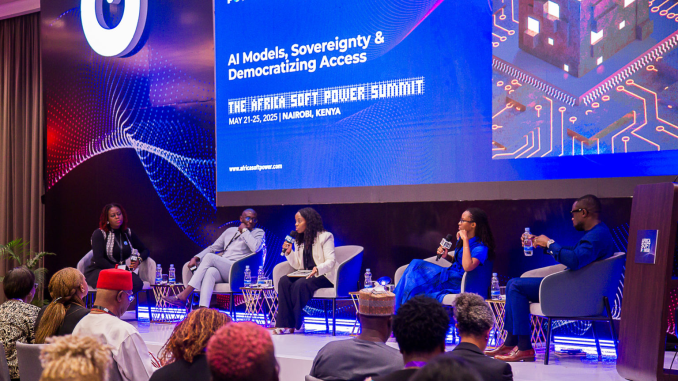
African leaders and global tech executives are calling for AI sovereignty as the continent seeks to shape artificial intelligence development rather than merely consume imported systems. The push comes as concerns grow about Africa’s representation in AI datasets and the need for technology solutions tailored to local contexts and languages.
The debate took centre stage at the fourth annual Africa Soft Power Summit in Nairobi, Kenya, where industry leaders from Google, Meta, and African organizations outlined strategies for ensuring the continent maintains control over its digital future. The summit, held from May 21-25 with the theme “Africa’s Growth Engine: Aligning the Flow of Money, Innovation, and Global Opportunities,” highlighted AI as a critical factor in Africa’s economic development.
During a panel on “AI Models, Sovereignty & Democratizing Access” within the Creative & Innovative Industries Conference, speakers emphasized that African digital sovereignty extends beyond traditional concepts of data control. Dr. Seydina Moussa Ndiaye, President of the Senegalese Association for Artificial Intelligence and Member of the UN High-Level Advisory Body on AI, argued that true digital sovereignty for Africa means “framing the technology within our own standards,” not just controlling data and infrastructure.
Against the backdrop of a summit focused on African leadership both on the continent and globally, maintaining a level playing field in AI emerged as a priority issue. Google Research Africa’s Lorna Omondi emphasized her organization’s efforts to make AI more inclusive and effective through African datasets and multilingual support for underserved communities.
“We have focused in this area on training models through African datasets and enabling multilingual support for undeserved communities. AI must solve the problems that matter most to African users – whether in agriculture, healthcare, energy access, or legal services,” Omondi explained. “When we buy language data from the ecosystem, we partner with local universities, local startups, local governments…we put that data that we’ve bought in the open markets, so that other startups can build on top of the same things we’re building.”
Dr. Seydina Moussa Ndiaye stressed the need for an Africa-centric definition of digital sovereignty that extends beyond traditional concepts of data and infrastructure control. “Digital sovereignty for Africa is not only controlling our data, controlling our infrastructure…It’s also about framing the technology within our own standards,” he said, noting this becomes even more important in an AI-driven age.
Muthoni Karubiu, Chief Operating Officer of Amini, emphasized context-appropriate solutions over massive infrastructure investments. “It’s not about building billion-dollar datacentres. It’s about understanding what works for our context,” she said, highlighting AI’s rapid evolution and the need for continuous education. “There’s nothing I can tell you today about AI that will still be true three years from now.”
The democratization of AI tools and fostering of local innovation was identified by the panel as critical for the continent’s success. Meta’s Kojo Boakye pointed to open-source AI models like Llama as significant enablers for African developers. “Open-source AI is one of the biggest opportunities we have. It allows developers and entrepreneurs to build without needing billions in capital,” he said, emphasizing that integrating AI into existing widely used applications is key to making technology accessible to broader populations.
Addressing concerns about technology company accountability and oversight, Boakye asserted that governments retain sovereignty and regulatory tools, citing instances of regulatory actions and fines. Companies like Meta operate within existing legal frameworks, adhere to content regulations, and collaborate with law enforcement agencies to address illicit material, he explained. “When it comes to regulation of tech companies, we are policed,” Boakye said, while acknowledging the complexities of content moderation in balancing legal requirements with free speech principles.
The summit provided an opportunity to demonstrate how AI and creative tech sector developments could be better implemented on the continent, while showcasing how Africa’s innovative approaches could benefit global economies and societies. In her opening remarks, Dr. Nkiru Balonwu, founder of the Africa Soft Power Group and lead convener of the summit, highlighted the importance of African leadership alongside innovation.
“May is Africa month. And we gather intentionally in this moment to honour our continent, in its remarkable richness, with 54 countries and a global diaspora, shaping industries around the world,” Balonwu said. “It isn’t just growing for itself, it is helping the world grow differently, more creatively, more sustainably, and more equitably. Africa’s creative and tech sectors have already proven themselves to be a powerful engine for growth, on both an economic and societal level. African soft power can be a hugely influential force in driving positive change.”
As AI’s influence accelerates across business and society, developing and incorporating African datasets to ensure such systems are fair, accurate, and relevant is critical for the continent. It’s also critical for the wider world, in a global ecosystem looking to retain geographic sovereignty as its digital infrastructure becomes increasingly interconnected.
